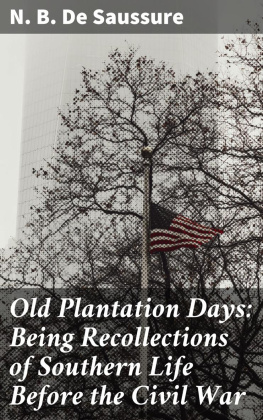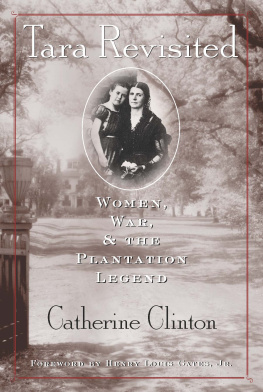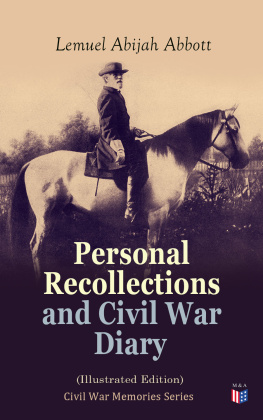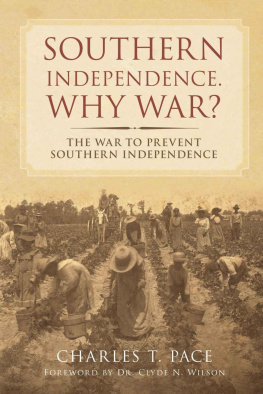Old Plantation Days
Table of Contents
My Dear Granddaughter Dorothy :
Grandmother is growing to be an old lady, and as you are still too young to remember all she has told you of her own and your mother's people, she is going to write down her recollections that you may thus gain a true knowledge of the old plantation days, now forever gone, from one whose life was spent amid those scenes.
The South as I knew it has disappeared; the New South has risen from its ashes, filled with the energetic spirit of a new age. You can only know the New South, but there is a generation, now passing away, which holds in loving memory the South as it used to be. Those memories are a legacy to the new generation from the old, and it behooves the old to hand them down to the new.
"The days that are no more" come crowding around me, insistent that I interpret them as I knew them; there are the happy plantation days, the recollection of which causes my heart to throb again with youthful pleasure, and near them are the days, the dreadful days, of war and fire and famine. I shrink as the memory of these draws near.
The spirit of those early days is what I chiefly desire to leave with you; the bare facts are history, but just as the days come back to my recollection I will write about them, and necessarily the record will be fitful memories woven together but imperfectly.
My father, your great-grandfather, was a direct descendant on his mother's side of Landgrave Smith, first Colonial Governor of South Carolina, his mother being Landgrave Smith's granddaughter; his grandfather was Pierre Robert, a Huguenot minister who emigrated to America, after the revocation of the edict of Nantes, and led the Huguenot colony to South Carolina.
My father was born in 1791 in the old homestead situated forty miles up the river from Savannah. He had twelve children, and I was one of the younger members of his large family. His early life was similar to the life of any present-day boy, with school days and holidays. During the holidays he enjoyed the excellent hunting and fishing which our large plantation afforded and which gave him great skill in those sports; later in life he brought up his own sons to enjoy them with him. He used to tell us, to our great entertainment, many incidents of his childhood days. When a little boy he used to drive through the country with his grandmother in a coach and four.
After he left South Carolina College he made a trip through the North on horseback, as this was before the time of railroads. It took him a month to reach Pennsylvania and New York State, and as it was in the year of 1812, he happened to ride out of Baltimore as the British rode in.
We children were always delighted when father told us of his many adventures, and the strange sights he saw during his travels. One episode always greatly shocked us, which was that of his seeing men in the public bakeries in Pennsylvania mixing bread dough with their bare feet.
After father returned home he married a cousin, Miss Robert. He had one son by this marriage, at whose birth the young mother died. This son returning from a Northern college on the first steamboat ever run between Charleston and New York, was drowned; for the vessel foundered and was lost off the coast of North Carolina.
Father's second wife was a descendant of the Mays of Virginia, who were descendants of the Earl of Stafford's younger brother. This lady was my own dear mother and your great-grandmother.
I must now tell you something about her grandmother, for my mother inherited much of her wonderful character from this stalwart Revolutionary character. My great-grandmother's eldest son, at nineteen, was a captain in the Revolutionary War, and she was left alone, a widow on her plantation. When the British made a raid on her home, carrying off everything, she remained undaunted, and, mounting a horse, rode in hot haste to where the army was stationed, and asked to see the general in command. Her persistence gained admittance. She stated her case and the condition in which the British soldiers had left her home, and pleaded her cause with so much eloquence that the general ordered the spoils returned to her.
Dearest child, in the intrepid spirit of this ancestor you will find the keynote to the brave spirit of the women of the South.
This old lady, who was your great-great-great-grandmother, lived to be a hundred and six years old; her skin was like parchment and very wrinkled; she died at last from an accident. I have heard my mother say that she was a remarkable character, never idle, and her mind perfectly clear until the day of her death. At her advanced age she knitted socks for my eldest brother, a baby then, thus always finding something useful to employ her mind and her hands.
Her son, my mother's father, was one of the most generous and benevolent of men, a pioneer of Methodism in that section of the country. He had a room in his house called "the minister's room." The ministers who went from place to place preaching were called circuit riders. These ministers always stayed at his house, hence "the minister's room" was very seldom vacant, and some ministers lived with him always.
Once there was a great scarcity of corn caused by a drought. Grandfather came to the rescue of the neighborhood. He sent a raft down to Savannah, which was the nearest town, and had brought back, at his expense, two thousand bushels of corn. He then sent out word to the poor of the surrounding country to come to him for what corn they needed, making each applicant give him a note for what he received. When he had thus provided for the immediate wants of the people, he generously tore up the notes; for he had only taken them to prevent fraud.
You will naturally wish me to tell you something of my mother, your great-grandmother. She was born on March 25, 1801, and was educated at the Moravian School in North Carolina, which is still in existence. I saw a very interesting description of this school in the Tribune of March, 1904.
Mother was well educated in all branches taught during her girlhood. Even after she was seventy-five years old she could repeat every rule of grammar and she always wrote with ease and correctness. This shows that what was taught in those days was taught with thoroughness, even if the studies were few and simple compared to the intricate and manifold ones of the present day. Mother was a woman of remarkable sweetness of disposition and intelligence, and had great executive ability, which latter quality was indispensable in the mistress of a large household of children and servants. She gave unceasing care and attention to her children, and personally supervised every detail of their education. Besides these duties, the negroes of the plantation, their food and clothing, care of their infants and the sick, all came under her control.










